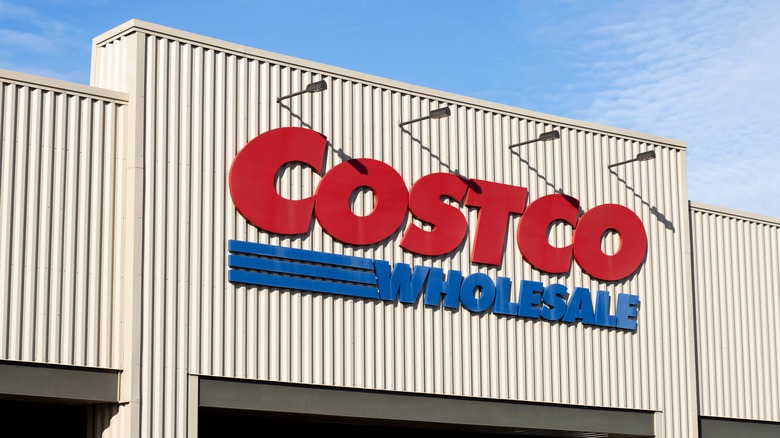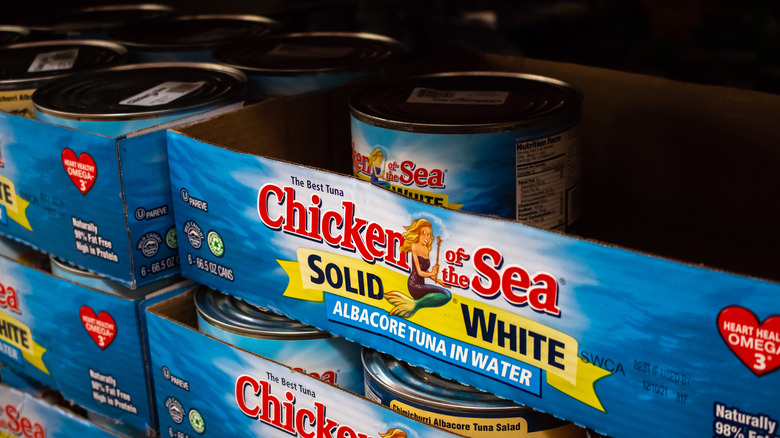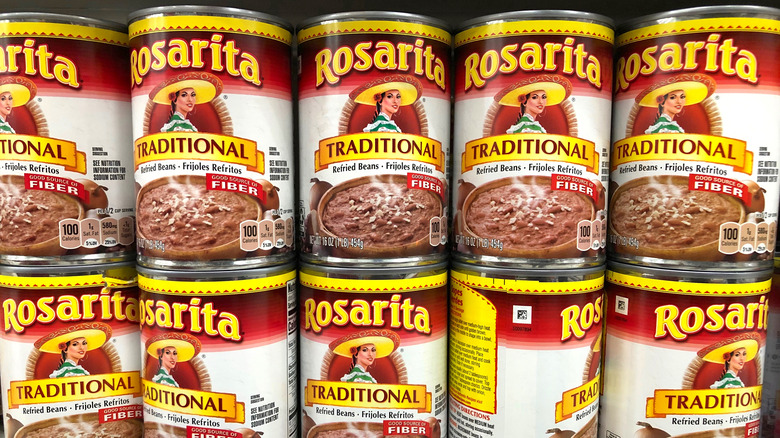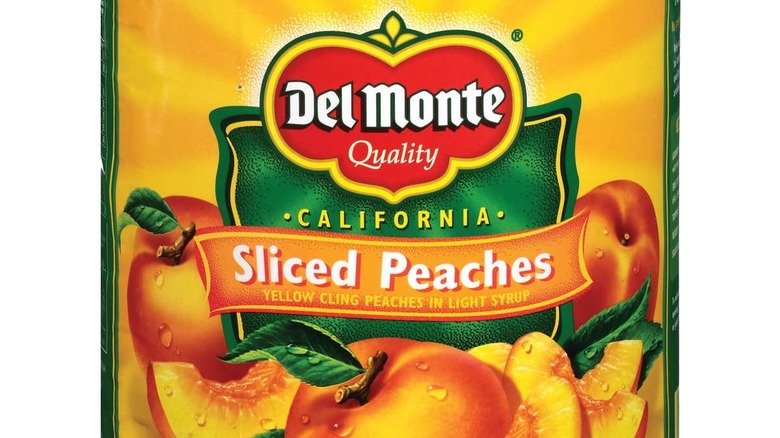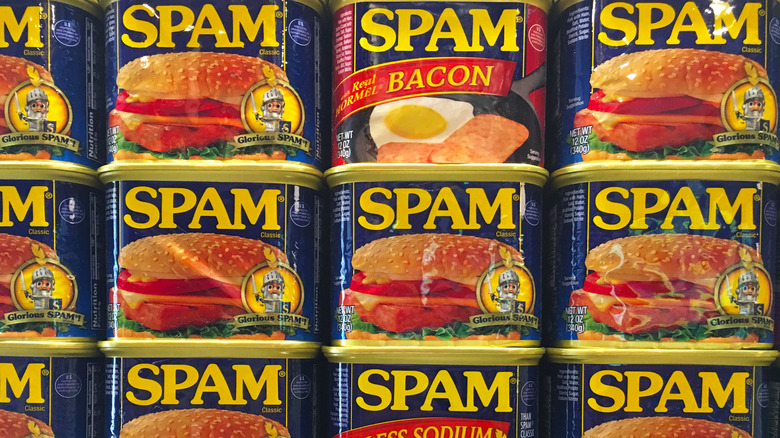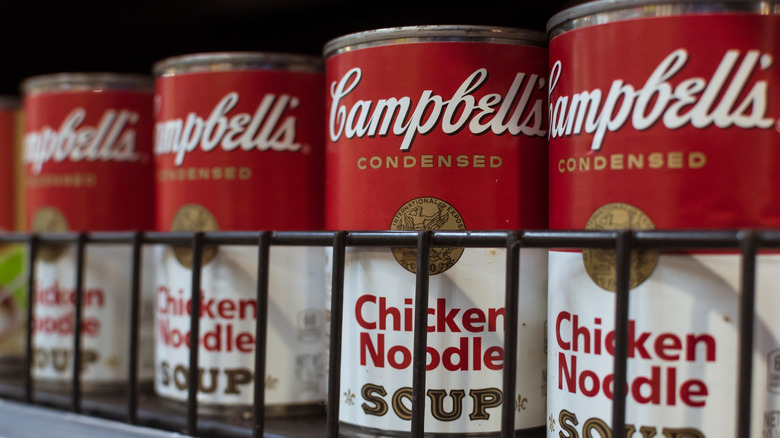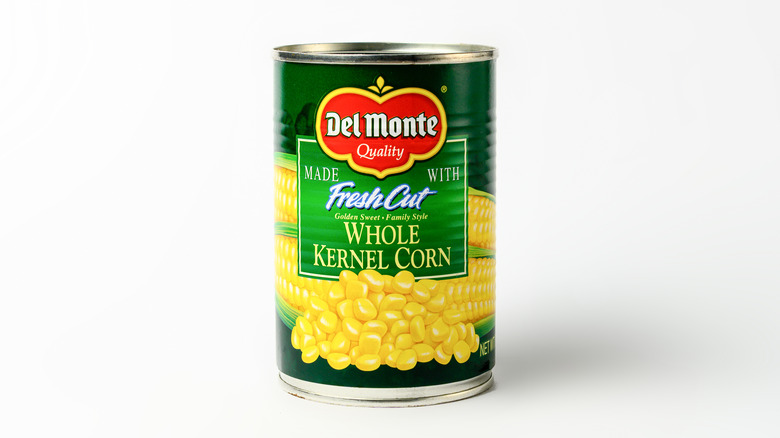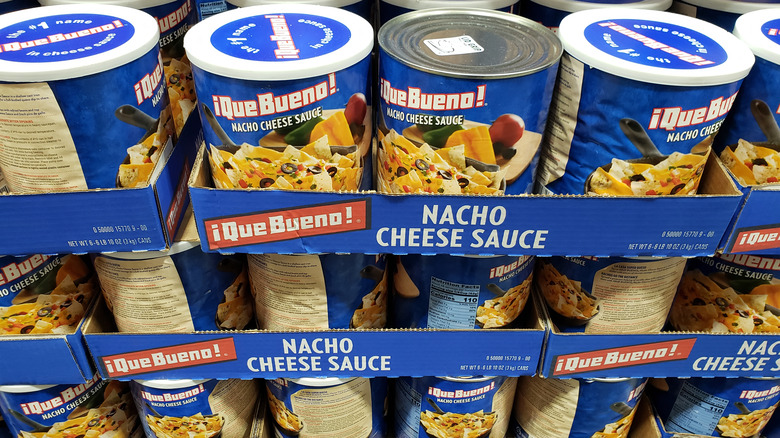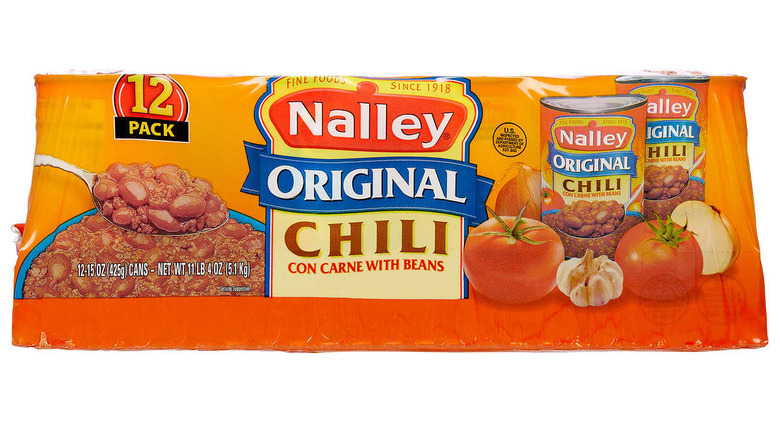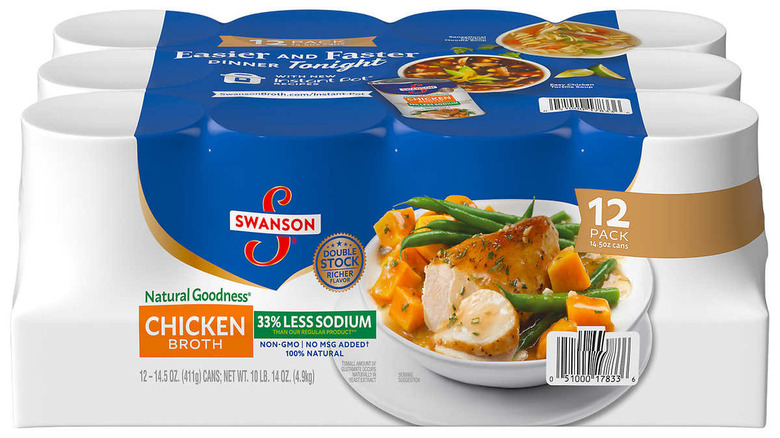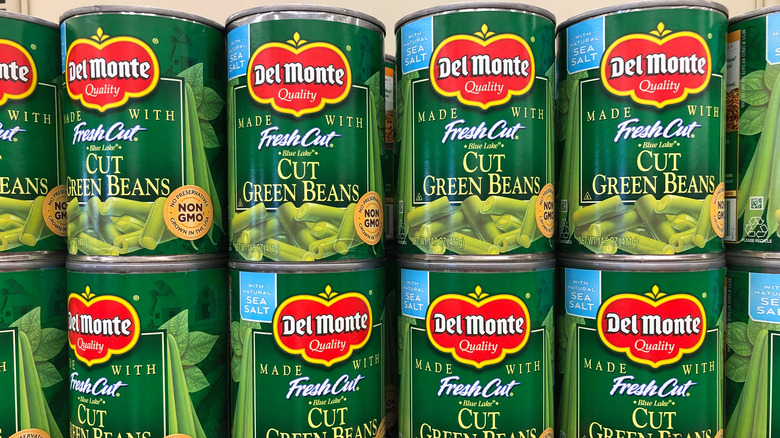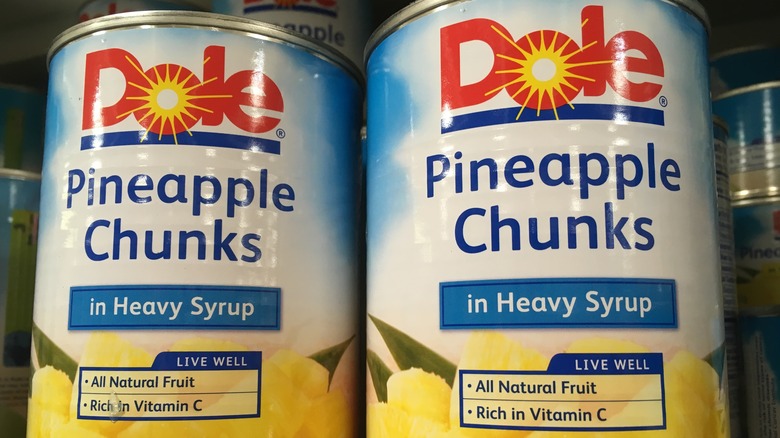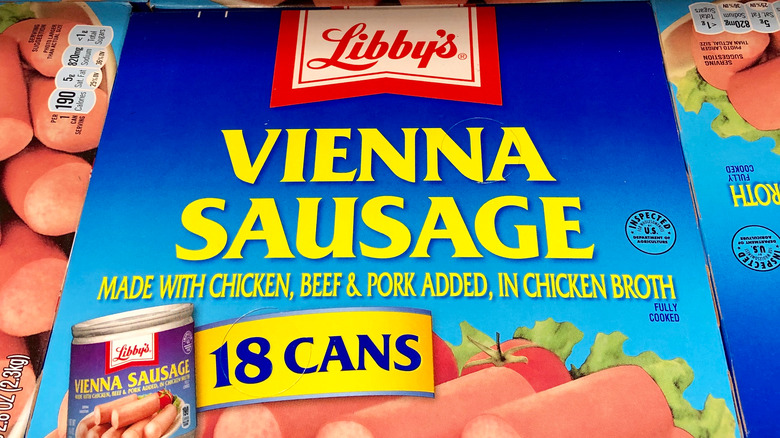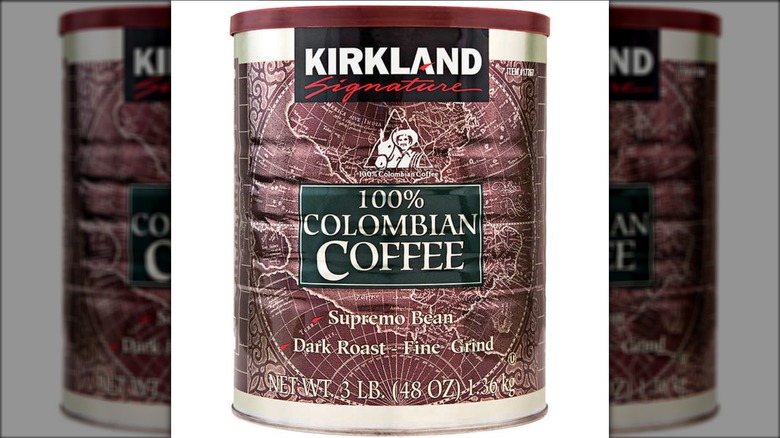Canned Foods You Should Never Buy From Costco
We may receive a commission on purchases made from links.
Costco is famed for its towering shelves stocked with everything from beef jerky to milk chocolate caramels. Pushing your shopping cart through the wide aisles of the members only chain feels like strolling through a wonderland of abundance. Where else can you buy an 8-foot teddy bear and a lukewarm hot dog all in the same place? Costco has a knack for carrying just about anything you could possibly need. For many families, that means it's a good place to stock up in bulk on canned foods.
While it's true that canned foods can really save you time and money when it comes to cooking, there are definitely some options that you should probably steer clear of for a multitude of reasons. But how do you sift through the seemingly infinite expanse of these aluminum-sealed goodies and decide what's worth it? Luckily for you, we drafted up a solid game plan. Here are some canned foods you should never buy from Costco.
Chicken of the Sea solid white albacore tuna
Canned tuna fish is one of the most consumed forms of seafood in America, per IntraFish. And as Healthline points out, while eating tuna does have a range of benefits, including being high in protein and low in fat, there are also downsides that you should consider. There are two main types of canned tuna fish: albacore, which is made from a larger species, and chunk light, which is mostly made from a smaller species of tuna called skipjack. According to Medical News Today, albacore tuna has nearly three times the mercury in it as chunk light tuna. In fact, albacore is so high in mercury that most adults should only eat a serving of it once every 10 to 14 days.
Costco carries solid white albacore tuna from Chicken of the Sea — one of the most widely canned tuna fish brands — and, no surprise, it's only available in bulk (by the case or via a single 66.5-ounce can). Having more albacore tuna around the house means that you'll probably be eating it on a regular basis. But now that you know albacore is high in mercury, let's agree that it's not good to get in the habit of eating too much albacore — and that starts by not buying it in bulk. If you're totally set on buying canned tuna at Costco, consider opting for Chicken of the Sea chunk light tuna instead, since it contains much less mercury.
Rosarita Traditional refried beans
Refried beans are creamy, delicious, and they're also a good source of nutrients like zinc, iron, and magnesium, according to Healthline. There's also no denying that refried beans taste great on tacos, nachos, and in seven layer dips. That said, buying 8 pounds of Rosarita refried beans at Costco probably won't bode well for your health.
While refried beans should be fine in moderation, they are probably not something you should be eating on a regular basis, which you're more likely to do if you have 8 pounds of them in your kitchen after buying them in bulk at Costco. A single serving (128 grams) from a can of Rosarita refried beans contains 580 milligrams of sodium — which is 25% of your recommended daily intake. Once again, Costco tempts you to buy in bulk, but eating lots of refried beans on a regular basis probably isn't a good idea. A better idea is to make your own refried beans, so that you can control the sodium level.
Del Monte sliced peaches
There's a lot you can do with canned peaches. You can toss them in a smoothie, make them into chutney, mix them into salsa, blend them into barbecue sauce, put them over ice cream, or even make your own peach-infused vodka, just to name a few ideas. That said, canned peaches often come swimming in a pool of heavy syrup, making them outrageously high in sugar content. According to HEB, just one full 15-ounce can of Del Monte sliced peaches in light syrup has over 45 grams of sugar — almost twice the amount of sugar you should consume in a day, per the American Heart Association.
Costco sells 106-ounce cans of Del Monte sliced peaches in light syrup, and unless you're baking cobbler for the entire neighborhood, there's very little reason you should be buying this. If you're in the mood for peaches, you're much better off just buying some fresh ones for the sake of your health. But if you do, you might want to follow Ted Allen's peach pro tip and eat that sweet globe of stone fruit goodness over the sink.
Spam
Spam doesn't exactly have a reputation for being the fanciest form of protein out there, but it does have some amazing versatility. Used in a wide range of dishes including the Korean stew budae jigae, fried rice, and breakfast hash, Spam has been a humble yet dependable staple in cuisines across the world since it first hit the market back in 1937. Unfortunately, none of this necessarily means that Spam's pervasive dietary presence is actually good for us. The absurd convenience of this beloved yet divisive mystery meat comes at a cost: It's also quite unhealthy.
According to Healthline, Spam contains a little protein but it's also high in sodium, fat, and calories. Buying an entire case at Costco means you'll likely be eating it on a regular basis, which could potentially wreak havoc on your health. All in all, rolling the dice on a bulk purchase of Spam at Costco doesn't seem worth it.
Campbell's chicken noodle soup
Campbell's chicken noodle soup, which is carried at Costco in packs of 12, is one of the most purchased grocery items in the United States, according to the Campbell Soup Company. Chicken noodle soup has a reputation for nursing us back to health in times of sickness. And while making it fresh can definitely be nutritious and filling, eating it out of a can is a completely different story.
One 10.75 ounce can of Campbell's chicken noodle soup contains over 2,000 milligrams of sodium, which nearly covers your recommended daily sodium intake. According to Men's Journal, excessive sodium intake can cause high blood pressure, and potentially lead to heart disease, and even a stroke. Do your health a favor and skip buying the bulk pack of Campbell's chicken noodle soup the next time you're in Costco. Instead, try making it fresh at home using a low-sodium broth.
Del Monte whole kernel corn
Corn is grown in most states on more than 90 million acres of land and processed into just about everything we consume, according to the US Department of Agriculture. It's fed to the livestock that we eat, baked into cereal flakes, made into flour, turned into syrups, and of course — shucked from the cob and sealed in a can. The reality is that there is no truly escaping corn.
Which is unfortunate, because as it turns out, corn really isn't all that great for you, especially when consumed in excess. While rich in some vitamins and minerals, it's also very starchy and can spike blood sugar levels, according to Healthline. So, the next time you're in Costco and you see stacks of Del Monte canned corn, you may want to just pass it by. There's a good chance you're already consuming massive amounts of corn in other processed foods that you're eating. If that's not enough reasons for you to lay off the canned corn, consider this: Del Monte has recalled their canned corn in the past from 25 states and 12 other countries due to toxins, according to Food Safety News.
Que Bueno nacho cheese sauce
There's no denying that nacho cheese sauce is delicious. Whether it's drizzled over tortilla chips, stirred into dip with some green chiles, or smeared onto burritos, nacho cheese sauce is a concentrated flavor bomb. Silky smooth, it also works great in casseroles and, of course, macaroni and cheese. One widely distributed brand of canned cheese is Que Bueno nacho cheese, which is available at Costco in cans that weigh 106 ounces. But before you pick it up and invite half the block over for a taco party, consider that a single serving of Que Bueno nacho cheese is over 20% of your sodium for the day. Honestly ask yourself this question: How likely are you to polish off nearly 7 pounds of nacho cheese before it expires?
Sky-high sodium and problematic leftovers aside, you should also consider the flavor factor. Making this stuff from scratch is easy and creates an exponentially more delicious sauce (just as long as you avoid common mistakes everyone makes when making nacho cheese). So don't let the magnetic pull of Costco's bulk items suck you in — just make a reasonable amount yourself. Your taste buds and your circulatory system will thank you.
Nalley Original chili
Chili is the perfect weekday dinner. Pair it with a simple bowl of rice, eat it with some tortilla chips, or even mix it into some macaroni and cheese and you have a solid, hearty meal. So when you're shopping at Costco and you notice the Nalley 12-pack of canned chili, you might think about picking some up to save yourself some time. The bad news is that in this case, saving yourself some time means pumping your body full of salt. Pretty much all canned chili is going to be super salty, but Nalley chili takes it to another level.
Shockingly, consuming one single 15-ounce can of Nalley original chili will put you at nearly 100% of your recommended sodium intake for the entire day, according to HEB. Do you really think having a dozen cans of this stuff around the house is a good idea? If you're in the mood for chili, avoid Nalley at Costco and make it fresh instead. With just a few ingredients and a little time, you can have a fresh pot of chili that's even tastier than the canned stuff — and way less salty.
Swanson chicken broth
The Swanson chicken broth at Costco comes in 12 packs of 14.5 ounce cans — an excessive amount, even for people who cook at home on a regular basis. Just like most things you buy at Costco, it's important to really ask yourself if having that much of this item is really necessary, and to also consider how it will affect your diet and overall health.
Similar to canned chicken noodle soup, canned chicken broth tends to be extremely salty. The good news is the version available at Costco is the Natural Goodness chicken broth which has 33% less sodium then the standard Swanson can. But you can do even better while shopping at the retailer. Kirkland signature organic chicken stock (available in a six pack of 32-ounce cartons) is higher quality and is a healthier choice when it comes to sodium and calories, per Fooducate. Though Kirkland's organic chicken stock is a bit pricier per ounce than Swanson chicken broth, we think it's well worth the upgrade.
Del Monte green beans
There can be a striking nutritional difference between canned foods and fresh foods, and this difference is on full display when it comes to Del Monte cut green beans, which are sold at Costco in 12 packs of 14.5 ounce cans. According to Prevention, while the fiber, calcium, and protein levels between fresh and canned green beans are about the same, there are some huge disparities in vitamin content: Fresh green beans offer 20% of your daily value of vitamin C, while canned green beans only offer a measly 4.5%. A similar divergence occurs with vitamin A, where fresh green beans boast 14% of your daily value while canned green beans only provide half that.
Instead of buying them canned in bulk from Costco, try opting for fresh green beans instead, if they're available. Sides don't get any easier to prepare than this delicious roasted green beans recipe.
Dole pineapple chunks
Sweet and tangy, pineapple is one of the most delicious fruits that Mother Nature has blessed us with. Of all the canned fruits, perhaps pineapple makes the most sense: Trimming off that harsh outer skin and cutting up a fresh pineapple can feel like a time-consuming undertaking, and canned pineapple completely removes us from all of that fuss. One of the most well-known brands of canned pineapple is Dole, which is sold in giant 108-ounce cans or in bulk packs of six 20-ounce cans at Costco. Unless you're making the world's biggest pineapple upside down cake or a humongous version of the highly divisive Hawaiian pizza, it's hard to imagine what most people would do with so much canned pineapple.
Quantity aside, there's another problem: Canned pineapple contains a lot of sugar. Depending on your diet, the American Heart Association recommends only 25-36 grams of sugar per day. While Dole pineapple chunks are high in vitamin C, one serving (122 grams) contains 15 grams of sugar — nearly all of the sugar you should have for an entire day. On top of this, like other canned goods, the squishy texture of canned pineapple leaves much to be desired. Skip the bulk canned pineapple and buy yourself fresh one at Costco instead (they sell them solo!) for a much healthier option. Don't worry, even though it seems intimidating, cutting up a pineapple is actually much easier than you think.
Libby's Vienna sausage
Sausage may be delicious when it's freshly made, but it's not terribly great for your health, and more highly processed versions tend to be even worse for you (via PBS). The contempt and mockery only grows when sausage is waterlogged and sealed inside of a can, as is the case with Libby's Vienna sausage, which is sold in bulk packs of 18 cans at Costco. If you're going to get some mini sausages, why not just buy cocktail weenies in the refrigerated section, which are guaranteed to taste better? It's hard to imagine why Libby's canned Vienna sausage even exists, let alone who feels the need to buy it in bulk from Costco. The taste is absolutely dreadful and it's nutritionally startling.
Libby's Vienna sausage is incredibly high in salt, saturated fat, and cholesterol. In fact, one single 4.6-ounce can contains 95 milligrams of cholesterol, which equates to nearly a third of the amount you should consume in an entire day. Here's the bottom line: A big part of what makes Costco so appealing is knowing that you can easily buy these items in bulk for a great value, but it's important to think about how eating something like canned Vienna sausage in mass quantities will affect your health.
Kirkland Signature Ground Coffee
According to the National Coffee Association, 66% of Americans consume coffee every day. That makes it the most popular beverage in the country, even beating out tap water. It's no wonder Costco sells its Kirkland Signature Colombian Ground Coffee in mammoth, 3-pound cans. But unless you enjoy the taste of stale java, this is one product you should leave on the warehouse shelf.
The problem with buying ground coffee in such a large container is that it's going to lose its freshness before you can finish it. According to Public Goods, an unopened, airtight package of ground coffee can last three to five months. Put it in the freezer, and it can keep for up to two years. However, when ground coffee comes in contact with oxygen, it begins to break down and lose its flavor and aromatic qualities (via Coffee Affection). This means that once you open that 3-pound can of Costco coffee, you only have a limited amount of time before you're drinking a subpar cup of joe. It's recommended to consume ground coffee within two weeks of opening the package. And if you're anything like the average coffee consumer, you're not getting through 3 pounds of the stuff in just two weeks. According to coffee lovers on Reddit, even the most ardent java connoisseurs were using, at most, a pound a week. At that rate, the final third of that Kirkland Coffee will end up stale, flavorless, and not worth the money.
